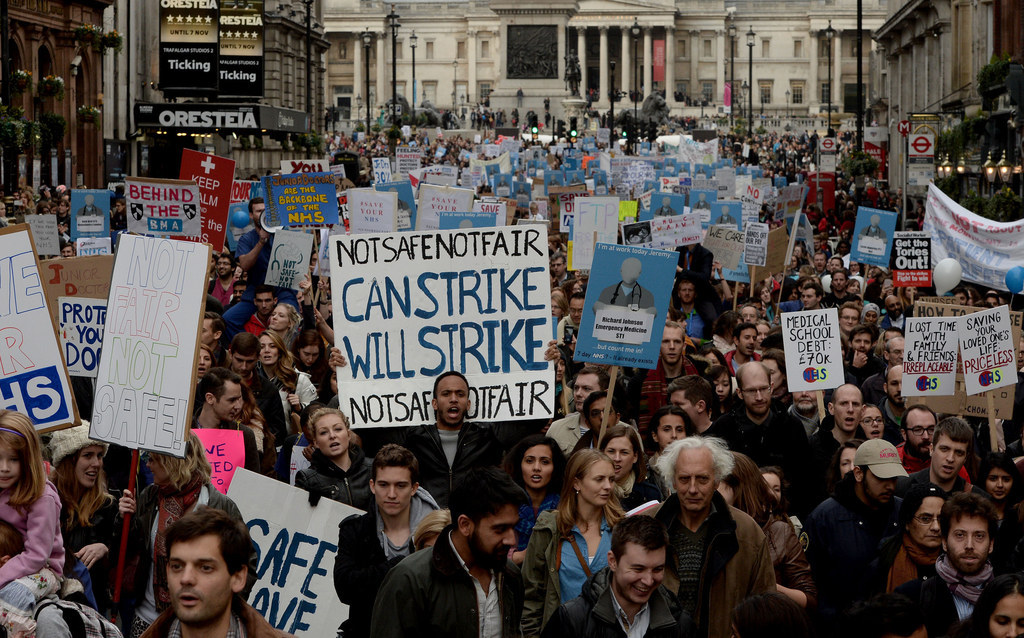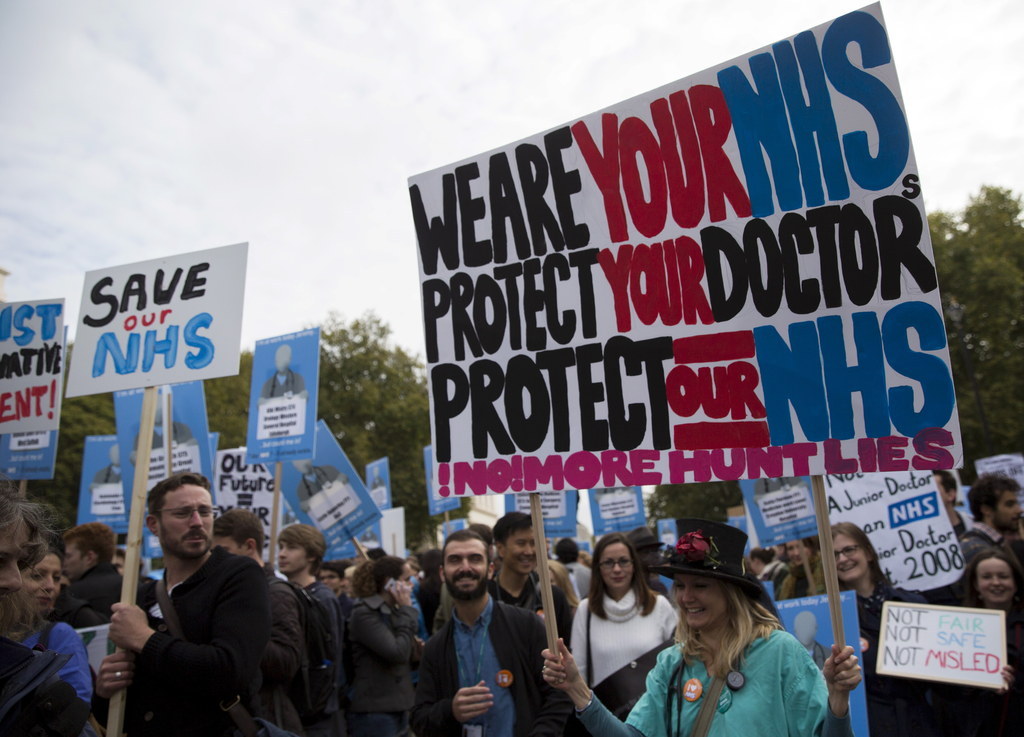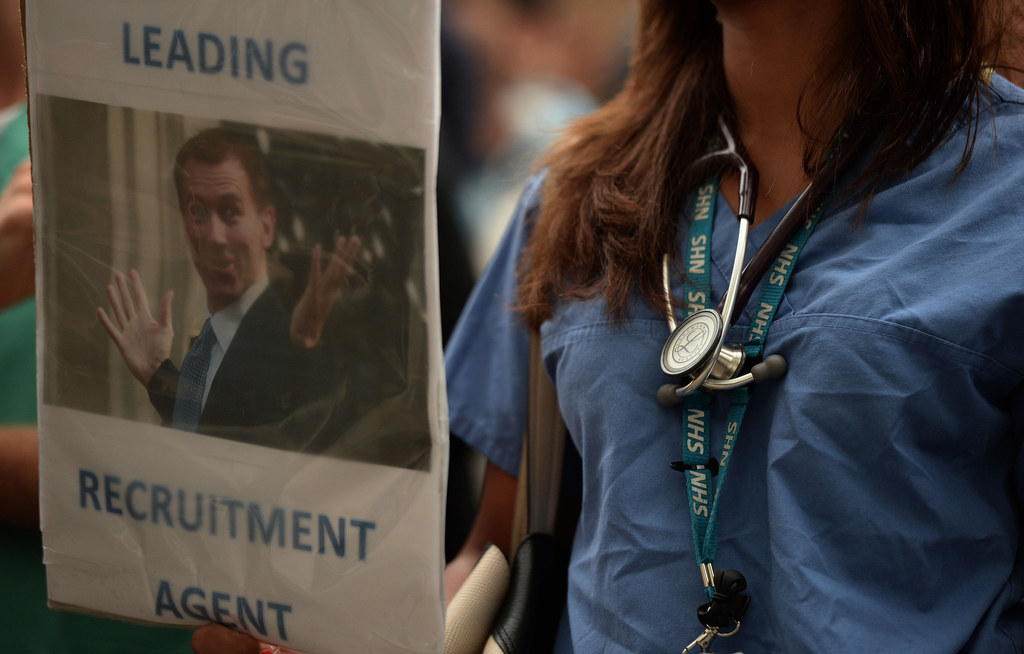Junior doctors have overwhelmingly voted in favour of industrial action over health secretary Jeremy Hunt's proposed new contracts, leaving the NHS facing a series of strikes next month.

The British Medical Association announced on Thursday that 98% of those balloted said they were prepared to take part in strike action.
There was a 76% turnout for the ballot, which opened earlier this month.
The BMA has invited Hunt to return to talks over the dispute.
Under proposed changes by the government to the way trade unions can call strikes, at least 50% of members entitled to vote must do so for a ballot to be valid, whereas currently there is no threshold.
Even if these changes were to go ahead, today's result would exceed the required amount of participation by more than 25%.
Junior doctors vote in favour of IA & invite @jeremy_hunt to @acasorguk talks #juniorcontract | More soon
The proposed strike dates are as follows:
* Emergency care only — from 8am, Tuesday 1 December to 8am Wednesday 2 December.
* Full walkout — from 8am to 5pm, Tuesday 8 December.
* Full walkout — from 8am to 5pm, Wednesday 16 December.
A revised junior doctors contract proposed by Hunt in order to promote a "seven-day NHS" is planned to go ahead next August. The new contract would see "sociable working hours", for which junior doctors are paid a standard rate, change from 7am–7pm Monday–Friday to 7am–10pm Monday–Friday and 7am–7pm on Saturdays.
Doctors have said that despite Hunt's offer of an 11% increase to basic pay, the changes to "sociable working hours" would mean many could see a pay decrease of around 30-40%.
The removal of safeguards that mean hospitals can be penalised for overworking juniors has also been criticised by doctors. So too has the scrapping of incremental pay rises, with increases instead based on moving through the stages of training and taking on more responsibility. The change to pay progression, it is felt, would have a particularly detrimental effect on women.

In a statement announcing that ballot result, BMA council chair Dr Mark Porter said:
While the BMA regrets the inevitable disruption that this will cause, junior doctors have clearly been left with no alternative but to consider strike action due to the government's continued threat to impose a contract that is unsafe for patients and unfair for doctors.
We have always been clear that we want to reach a negotiated agreement. To this end, and even with such a resounding mandate, we are keen to avert the need for industrial action and have, therefore, approached [independent mediator] ACAS to offer conciliatory talks with the health secretary and NHS employers to clarify the conflicting information coming from the government over the past weeks.
Jeremy Hunt stood by his commitment that under the new contract junior doctors would receive a "generous" pay increase while seeing their working hours reduced. He called their decision to vote in favour of industrial action "regrettable".
In a statement responding to the ballot result, he said:
It is regrettable that junior doctors have voted for industrial action which will put patients at risk and see operations cancelled or delayed. We want to ensure patients have the same quality of care across the week and have put forward a generous offer that increases basic pay by 11% and reduces doctors' hours. We hope junior doctors will consider the impact this action — especially the withdrawal of emergency care — will have on patients and reconsider.
Read the full response to #juniorcontract strike announcement: https://t.co/enFIceuysR 2/2
Speaking to BBC political editor Laura Kuenssberg Hunt said he wouldn't consider going to independent arbitration with ACAS before the BMA got back around the negotiating table with the government.
A spokesperson for the Department of Health reiterated Hunt's message that conciliation was not being ruled out but should follow meaningful talks with the BMA.
"We have already sought independent views on contract reform — having asked the independent [Doctors' and Dentists' Review Body] for advice which formed the basis of our offer, an offer which the BMA have so far refused to talk about," they said in a statement. "Both the BMA and the government gave evidence to the DDRB.
"We continue to urge the BMA to come back round the table, and as the health secretary said earlier this week, there are no preconditions to any talks."
Ahead of the ballot result, Hunt last night chaired a contingency planning meeting with health experts and other government departments to assess the impact of industrial action on patients, the DoH spokesperson said.
Hunt is obviously furious with the BMA - problem is many junior docs are furious with him
Following the announcement, junior doctor Rachel Clarke told BuzzFeed News that it was in "absolute desperation" that doctors voted in favour of industrial action.
"It is no cause for celebration whatsoever. None of us want to strike so this is an act of last resort," she told us, but said that months of appeals to the health secretary from thousands of doctors had fallen on "deaf ears".
"We have spoken unequivocally against the new contract because it's dangerous to patients, so it's our duty to them in the long term to protest against it going ahead."
She added that many felt Hunt had left them with "no choice" but to vote in favour of a strike, but "it's with heavy hearts that we've made this decision".
Will Cooke, a junior doctor based in London, told us that it was a "sad day for patients that we, as doctors, are forced to down tools today to protect the patients of tomorrow".
Another junior doctor, Jessica Hanlon, told us she was proud that doctors were united and were "standing up in the face of threats and bullying and hopefully leading the way for everyone in the NHS to fight to protect the best health system in the world".
She added that she hoped doctors would receive public support over industrial action. "This is the last thing we wanted to do," she said. "We are doing it for them and we are doing it for us."
"It is an unpleasant choice to make," junior doctor Amy Lindh told us of her decision to vote for industrial action. "But sadly our hand was been forced in the absence of a genuine promise of open negotiations with no leverages being used".
Dr Osman Khalid said he was "relieved" by the result: "We're standing our ground and hopefully the government will begin to change their minds now."
A specialist in emergency medicine who would potentially cover junior doctors' shifts during industrial action, Dr Amir Reyani, told us that A&E would not be hindered.
He added that there was resounding support for junior doctors within the senior medical community. "I have not come across any senior in my trust who has not been supportive of this," he said.

Labour's shadow health secretary, Heidi Alexander, said that Hunt needed to take responsibility for the fact that this would be the first time in 40 years that junior doctors have voted to take significant industrial action.
"There is clearly huge anger about the way in which these negotiations have been handled by the government," she said in a statement. "It is imperative that in the next 10 days Jeremy Hunt and David Cameron find a way to avoid a strike."
She said that there had been a fundamental breakdown in trust between junior doctors and Hunt, "which is bad for the NHS and bad for patients."
Alexander has written to the prime minister to suggest bringing in independent mediator ACAS to avoid the proposed strike. "If he dismisses this suggestion, he will be risking patient safety in both the short and long term," she said in Thursday's statement.
Huge Junior Dr vote in favour of industrial action. The PM must do responsible thing & call in independent mediator for sake of patients.
In the letter to the prime minister she wrote that doctors had "lost confidence that the health secretary is conducting negotiations in good faith," The Independent reported.
"As a result I am deeply sceptical that a timely resolution can be found whilst the health secretary retains responsibility for concluding these negotiations".
Earlier this week Hunt wrote to the chair of the BMA's junior doctors committee, Johann Malawana, to say that a strike was "entirely avoidable".
Hunt denied that there were any preconditions that would prevent the BMA from negotiating with the government, and reiterated his promise that "no junior doctor working within legal limits will see their pay cut and that none will be required to work longer hours".
But, Hunt's letter continued, "I am sure you understand that we reserve the right to make changes to the contracts if there is no progress on one of the issues preventing a truly seven-day NHS".

Last month Malawana told BuzzFeed News that junior doctors felt backed into a corner by the government over the new contract. "We do not like the idea of industrial action at all, but the mood in the profession is that we understand that if we don't do something, and if we just allow this to happen, what is potentially disruptive for a short period of time will turn into the NHS not being delivered over a generation."
Junior doctor Sundeep Grewal, who has been instrumental in organising mass-protests by doctors during the contract dispute also felt that industrial action was a necessary last resort. "We will not go away until meaningful negotiations have happened and this is resolved," he told us recently. "We're not going to stop."
Following Thursday's ballot result Grewal said that Hunt had continued to alienate doctors, and it was therefore with a "with a very heavy heart", that doctors would go ahead with strikes.
"We are desperate for Hunt to stop his destructive plans and avoid industrial action," Grewal added, but if those plans weren't to change, he said he has "no doubt industrial action will continue in the new year".
